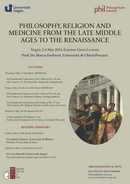Philosophy, Religion and Medicine from the Late Middle Ages to the Renaissance
Siegen, 2-4 May 2024, Erasmus Guest Lectures Prof. Dr. Marco Forlivesi (Università di Chieti-Pescara)
The block seminar provides a concise introduction to the history of philosophy between the 15th and 17th century. The main part of the seminar consists of a series of lectures in English delivered by Prof Marco Forlivesi (Università degli Studi di Chieti-Pescara, Italy), who will be visiting the University of Siegen during the summer term as part of the Erasmus+ Programme (Staff Mobility for Teaching). The lectures will be complemented by reading seminars and group exercises.
On the content of Prof Forlivesi’s lectures:
Since the years at the turn of the 12th and 13th centuries, when Latin thinkers encountered Aristotle’s physical and metaphysical works, to the last quarter of the 17th century, when the pars valentior of European authors turned their backs on some of the fundamental theses of Aristotle’s physics, public universities and the studia of religious orders were the scene of a rich speculative flowering. Of this long period of time, the 13th and 14th centuries are customary subjects of study for historians of medieval philosophy; by contrast, the age extending from the 15th to the 17th century is still little explored territory. In these centuries, in universities and studia in general, an avowed traditionalism was at one with a constant genesis of new ideas; a multitude of writers were the protagonists of an impetuous confrontation between the different souls of antiquity and the Middle Ages; the first elements of modern scientific thought sprouted there or were opposed; many of the fundamental elements of modern thought were born there. In order to understand this age, therefore, it is essential to liberate oneself from the restrictive use of terms such as ‘humanism’ and ‘scholasticism’ and to consider the totality of the components of the philosophical and theological culture of those centuries and how they interacted with one another. The first step of the course will be to promote an awareness of the historical and evolutionary nature of the historiography of philosophy and theology; thanks to this, it will be possible to show that a different account of the development of philosophical thought from the late Middle Ages to the Early Modern Age is advisable.
LECTURES
• Thursday, 2 May, 15-18h, Room AR-NB 0105
The Fundamental Components of the Culture of the 15th and
16th Centuries (I): The Universities; Humanism; Aristotelianism
• Friday, 3 May, 10-12h & 16-18h, Room AR-NB 0105
The Fundamental Components of the Culture of the 15th and
16th Centuries (II): Platonism; Alchemy, Astrology, Medicine
The Fundamental Components of the Culture of the 15th and
16th Centuries (III): Religious Tensions and Movements; The Courts
• Saturday, 4 May, 10-13h, Room US-A 017
A Historiographical Paradigmatic Case:
The Historical Development of the Notion of ‘Scholastic Philosophy’
READING SEMINARS
• Friday, 3 May, 13-16h, Room AR-NB 0105
Dr. Andrea Fiamma (Università di Milano)
Nicholas of Cusa, Idiota de mente
• Saturday, 4 May, 15-18h, Room US-A 017
Dr. Luca Burzelli (Universität Siegen)
Pietro Pomponazzi, Expositio super tertio libro De coelo



